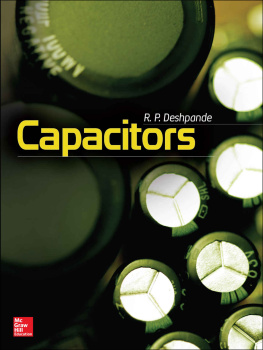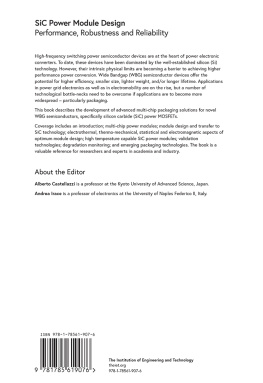Copyright 2015 by McGraw-Hill Education (India) Private Limited. All rights reserved. Except as permitted under the United States Copyright Act of 1976, no part of this publication may be reproduced or distributed in any form or by any means, or stored in a database or retrieval system, without the prior written permission of the publisher.
ISBN: 978-0-07-184857-2
MHID: 0-07-184857-6
The material in this eBook also appears in the print version of this title: ISBN: 978-0-07-184856-5, MHID: 0-07-184856-8.
eBook conversion by codeMantra
Version 1.0
All trademarks are trademarks of their respective owners. Rather than put a trademark symbol after every occurrence of a trademarked name, we use names in an editorial fashion only, and to the benefit of the trademark owner, with no intention of infringement of the trademark. Where such designations appear in this book, they have been printed with initial caps.
McGraw-Hill Education eBooks are available at special quantity discounts to use as premiums and sales promotions, or for use in corporate training programs. To contact a representative please visit the Contact Us page at www.mhprofessional.com.
The sponsoring editor for this book was Michael McCabe and the production supervisor was Pamela A. Pelton. The art director for the cover was Jeff Weeks.
Information contained in this work has been obtained by McGraw-Hill Education from sources believed to be reliable. However, neither McGraw-Hill Education nor its authors guarantee the accuracy or completeness of any information published herein, and neither McGraw-Hill Education nor its authors shall be responsible for any errors, omissions, or damages arising out of use of this information. This work is published with the understanding that McGraw-Hill Education and its authors are supplying information but are not attempting to render engineering or other professional services. If such services are required, the assistance of an appropriate professional should be sought.
TERMS OF USE
This is a copyrighted work and McGraw-Hill Education and its licensors reserve all rights in and to the work. Use of this work is subject to these terms. Except as permitted under the Copyright Act of 1976 and the right to store and retrieve one copy of the work, you may not decompile, disassemble, reverse engineer, reproduce, modify, create derivative works based upon, transmit, distribute, disseminate, sell, publish or sublicense the work or any part of it without McGraw-Hill Educations prior consent. You may use the work for your own noncommercial and personal use; any other use of the work is strictly prohibited. Your right to use the work may be terminated if you fail to comply with these terms.
THE WORK IS PROVIDED AS IS. McGRAW-HILL EDUCATION AND ITS LICENSORS MAKE NO GUARANTEES OR WARRANTIES AS TO THE ACCURACY, ADEQUACY OR COMPLETENESS OF OR RESULTS TO BE OBTAINED FROM USING THE WORK, INCLUDING ANY INFORMATION THAT CAN BE ACCESSED THROUGH THE WORK VIA HYPERLINK OR OTHERWISE, AND EXPRESSLY DISCLAIM ANY WARRANTY, EXPRESS OR IMPLIED, INCLUDING BUT NOT LIMITED TO IMPLIED WARRANTIES OF MERCHANTABILITY OR FITNESS FOR A PARTICULAR PURPOSE. McGraw-Hill Education and its licensors do not warrant or guarantee that the functions contained in the work will meet your requirements or that its operation will be uninterrupted or error free. Neither McGraw-Hill Education nor its licensors shall be liable to you or anyone else for any inaccuracy, error or omission, regardless of cause, in the work or for any damages resulting therefrom. McGraw-Hill Education has no responsibility for the content of any information accessed through the work. Under no circumstances shall McGraw-Hill Education and/or its licensors be liable for any indirect, incidental, special, punitive, consequential or similar damages that result from the use of or inability to use the work, even if any of them has been advised of the possibility of such damages. This limitation of liability shall apply to any claim or cause whatsoever whether such claim or cause arises in contract, tort or otherwise.
To
All electrical and electronic engineering professionals
ABOUT THE AUTHOR
R. P. Deshpande has more than 40 years of experience in the capacitor technology sector. He has worked as a consultant with capacitor manufacturing organizations, both growth-oriented start-ups and established companies, to help them achieve leading industry positions. Throughout his career, Mr. Deshpande has pioneered the development of many capacitor products, technologies, processes, and related applications. His recent research has focused on ultracapacitors, and his work on the use of capacitors for energy storage and alternative energy is widely recognized. Mr. Deshpande is a Fellow of the Institution of Engineers (India) and an electrical engineering graduate of the Indian Institute of Technology, Mumbai.
CONTENTS
FOREWORD
The role of capacitors to help improve grid efficiency and reliability can hardly be overstated. By producing reactive power, capacitors compensate for the reactive power consumption of electrical motors, transformers, etc. This results in more stable power grids with increased transmission capacity and reduced losses. Though an elementary electrical device, its applications in emerging fields, such as smart-grids and renewable energy, have underscored capacitors versatility and business value.
The book Capacitors is an authoritative account about capacitors and related developments. Mr. Deshpandes deep theoretical knowledge and an envious industry experience provide for ample academic treatment about the subject matter and, an evolutionary perspective of capacitor technology.
The book covers capacitors for both electrical and electronic fields in sufficient details, including latest development trends. Possibility of using ultracapacitors for grid stability and power quality through active power management are very interesting. The new breed ultracapacitors are seen to have opened many new avenues for capacitor applications.
Importantly for electrical or power engineering students, as also for electronic engineers, the book brings forward capacitors diverse business applications and this, in my opinion, could prove inspirational for many to choose it as a career option. As a reference guide, this work is equally valuable to young and mid-career professionals and as also to entrepreneurs connected with capacitors.
I recommend this book to anyone who wants to learn about the exciting field of capacitors, and urge colleges and universities to make it available through their libraries.
J.S.S. RAO
Principal Director
National Power Training Institute
Ministry of Power, Government of India
FOREWORD
Capacitor, a basic component in electrical and electronic engineering, engulfs varied functions in electronic circuits, automobiles traction, mobiles, motors and power supplies, to mention a few. The author, in this book, brings together up to date information on most present-day capacitors. This book is the outcome of vast experience of the author in the capacitor industry.
The strength of this book lies in the comprehensive technical data and latest manufacturing practices relevant to the users in the capacitor industry. The richness of the book lies in its wide coverage of the subject matter, starting with a brief history of capacitors, their types, as also suitability for different applications. It dwells at length on basics like dielectrics, electrodes, construction and manufacture of capacitors and describes the latest trends and developments taking place in capacitor fields. All types of dielectrics and capacitors including XY safety capacitors are covered. Several applications of capacitors in power electronic circuits, automotive industry, power factor management, harmonic control are discussed in separate chapters.













